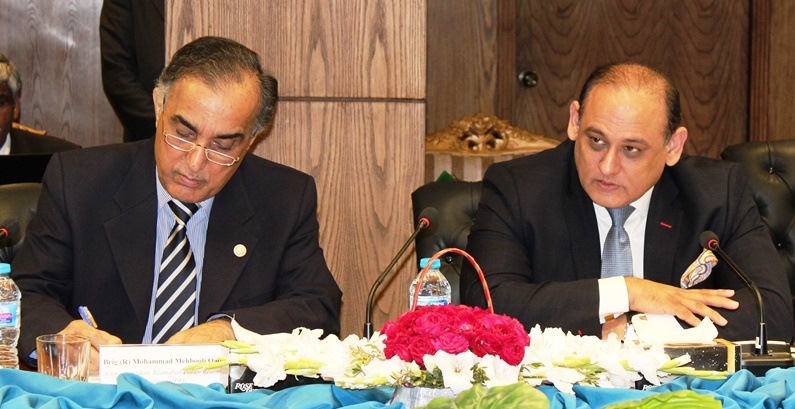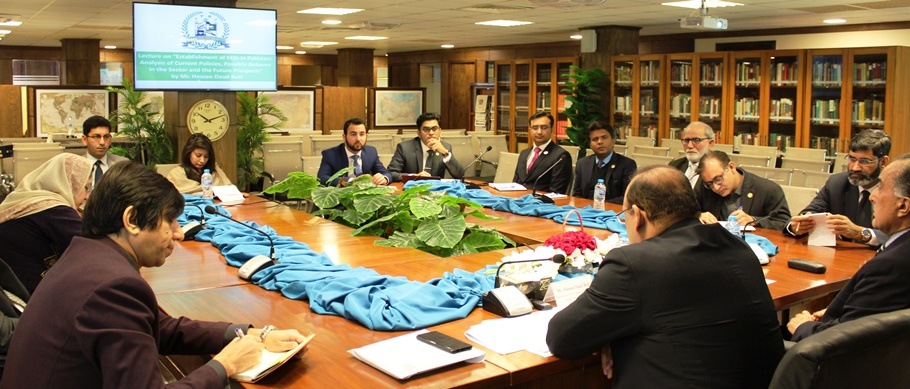Guest Lecture 04/03/2019
The Islamabad Policy Research Institute (IPRI) organized a talk on “Establishment of Special Economic Zones (SEZs) in Pakistan: Analysis of Current Policies, Possible Reforms in the Sector and the Future Prospects” on February 12, 2019 at IPRI conference hall. Mr. Hassan Daud Butt, Project Director/CPEC Coordinator/Focal Person CPEC was the guest speaker. The audience included scholars from IPRI.
The China-Pakistan Economic Corridor (CPEC) has given an impetus to Pakistan’s struggling economy. The country is battling militancy for over a decade and is still fighting the extremist tendencies, and hostile elements, both at home and at regional front. In view of the optimism that every Pakistani links with CPEC, the SEZs to be built within the corridor project are equally important. The SEZs have opened up economic opportunities as well as job incentives for the locals of the area. Meanwhile, the dispute over, which province is getting more benefit and feeling of being left out in the development process has generated a debate at the country level. The subject lecture was organized to get firsthand knowledge about the ongoing development work and the impediments the government is facing in implementation of the desired SEZs.


Salient Points
The salient points of the lecture are as under:-
- Mr. Hassan Daud Butt while referring to Pakistan-China bilateral relations and the economic cooperation under CPEC said that the initial focus was on industrial cooperation. The idea of establishing SEZs came about later, and it is an attempt to improve the human resource indicators. Further, he elaborated that the empowerment of backward areas has been the sole purpose of the government of Pakistan. The SEZs are the brain child of Pakistan side and the aim is to generate jobs along with technical exchange with Chinese companies.
- He reiterated that economic stability with Gross Domestic Product (GDP) 7 percent is a priority for the government. The success so far in the endeavor is at the initial phase. The projects like the SEZs are efforts to attract foreign investment and promote business-to-business ties between the local and Chinese industries. Mr. Butt informed that a 25 member team comprising experts from the business community along with government officials has been setup to study the feasibility of the areas allocated for the SEZs.
- On Pakistan’s economic ties with China, he negated the perception that Pakistan is going to be a junkyard of China. He opined that the economic progress of China is a model for developing countries. The Chinese government’s innovative trade practices involving capitalist style economy along with balanced conservative approaches have pushed the economy towards upward trajectory. China’s economic situation during the 1980s was similar to the present day economy of Pakistan. But China has been successful in eradicating poverty at the grass roots level.
- The SEZs will generate ’85-million-jobs’ worth of industry. The agricultural and industrial sectors are likely to grow.
- The sites of SEZs have been selected by provincial governments. The number of SEZs being built is nine. The initial plan was to create 37, however, the poor human resource and economic constraints did not allow to carry on with more. Currently, the SEZs are ICT Model Industrial Zone, Islamabad, Port Qasim (near Karachi) and Dhabeij (close to Thatta (Sindh), Allama Iqbal Industrial City (Faisalabad, Punjab), Bostan Industrial Zone (Quetta, Balochistan) and Rashakai (Nowshera) and Mohmand Marble City (Khyber Pakhtunkhwa), Moqpondass SEZ Gilgit-Baltistan and Mirpur, Azad Jammu and Kashmir. The SEZ build in Mirpur was initially planned in Bhimber.
- The government has approached the Chinese leadership for assistance in human resource. Expert teams from China have visited Pakistan, and are in collaboration with the provincial governments. To a question concerning the impact of Chinese industry on local enterprises, Mr. Butt said that China was far ahead of Pakistan in research and technical expertise. Pakistan cannot match the skilled labour of China. However, the industrial cooperation with China is designed in such a manner that the initial focus will revolve around labour intensive industry, and gradually after five years will shift to technical intensive industry. This will benefit Pakistan.
- He also explained the difference between Pakistan and China at policy levels. In Pakistan, the acquisition of land for business purposes is difficult and involves various bureaucratic channels. The Board of Investment (BoI) back in 2016 was given the task to take lead on SEZs. The bureaucratic norms have impeded the BoI working. The timelines assigned for specific projects were re-adjusted. He suggested that to speed up the business activities for SEZs, a one window operation should be launched. He also encouraged the government-private sectors partnership in development work.
- While commenting on business environment in Pakistan, Mr. Butt underscored that for new business starters’ there were lots of problems. He called for joint business ventures between Pakistan and China. He said that the Chinese companies will bring in new technology and their skilled manpower can transfer their expertise to the locals.
- He ruled out the possibility that Chinese will take over Pakistan industry, and the labour in the country will suffer due to Chinese workers. He said that firstly Chinese industry cannot weaken the demand for Pakistan’s local products. Meanwhile, the Chinese entrepreneurs which will work in Pakistan can be made to sign an agreement under which the company shall be bound to take a certain segment of Pakistani workforce.
- He did not view the Chinese language as a barrier between the work force of two countries. He said that the labour and business community from both sides can easily interact in English.
- The talk concluded that China and Pakistan have convergence of interest geopolitically, which has brought the two partners closer. Besides, China looks at Pakistan as a door to Muslim world. China wants to learn from Pakistan how to do business with Muslims. He opined that ‘Confucianism’ and ‘Islam’ have a lot in common, both supported peace and just cause.
Disclaimer: Views expressed are of the speaker and are not necessarily reflective of IPRI policy.
